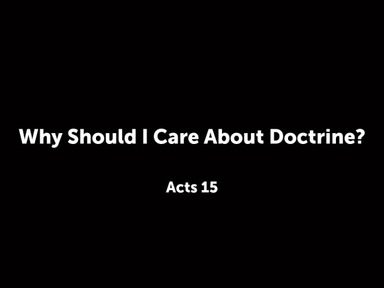Why Should I Care About Doctrine?

Doctrine. (Gk. didaskalia). Act of teaching or that which is taught. The use of the term in Scripture, however, is broader than a simple reference to information passed on from one person to another or from one generation to the next. Christianity is a religion founded on a message of good news rooted in the significance of the life of Jesus Christ. In Scripture, then, doctrine refers to the entire body of essential theological truths that define and describe that message (1 Tim. 1:10; 4:16; 6:3; Titus 1:9)
Doctrines Address Serious Questions
Religious denominations
Definition
Groups within the same religion distinguished (usually) by non-essential differences in thought or practice.
Doctrines Have Serious Implications
It is not uncommon for Protestant Christians today to summarize their primary doctrinal commitments with five “solas”: sola Scriptura, sola gratia, sola fide, solus Christus, and soli Deo gloria.
By speaking of the law as an unbearable yoke, Peter was not denying that the law was God’s gift to Israel. Rather, he was arguing that Israel was unable to fulfill it perfectly and that salvation could not be obtained through the law (cf. Rom. 2:17–24). Only one means of salvation exists for both Jew and Gentile: God’s “grace” (Acts 15:11) in Jesus Christ.
Doctrines Necessitate Serious Response
Despite the common basis of salvation for Jews and Gentiles, a number of restrictions were required (v. 29; 21:25). Some scholars think these may have been introduced as a way for Jews and Gentiles within the church to have a common basis for contact. But it is more likely that these were designed to elevate the moral standards of the Gentiles by prohibiting them from engaging in a number of the practices that were associated with pagan temple rites such as animal sacrifice, sexual immorality, and idolatry.
he may have been saying that the standards he demanded of Gentiles in v. 20 reflected universal moral laws that were enshrined in the law of Moses.
